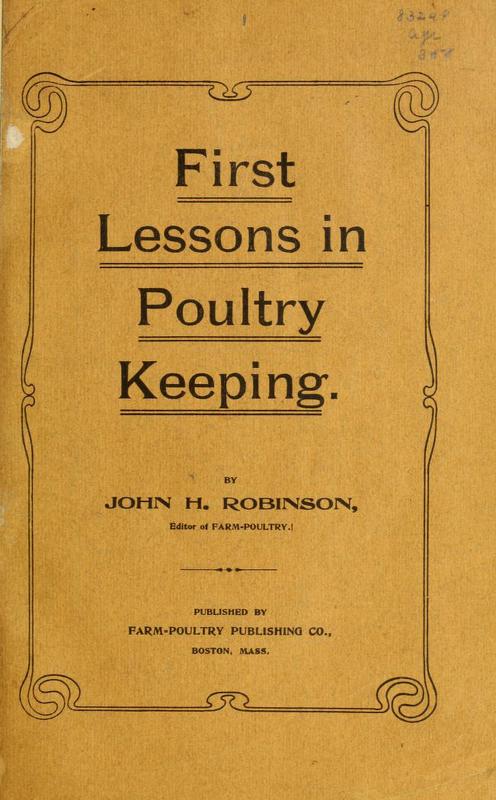First Lessons in Poultry Keeping: First Year Course
Title
First Lessons in Poultry Keeping: First Year Course
Creator
Date
Publisher
Farm-Poultry Publishing Company. Boston, MA
Subject
Excerpt
Before taking up the regular work of this course every reader who intends to follow it through the year should consider carefully a few propositions about poultry keeping. These may not be in accordance with some ideas about it which he has absorbed, he knows not where; but if he is to get much benefit from these lessons he must accept them, at least provisionally, and pursue his study and carry on his work on the assumption that they are correct.
The first of these propositions is this :
(1). Poultry keeping is a simple occupation in that it requires no great knowledge or ability.
Among successful poultry keepers we find men and women of practically all grades of intelligence and all degrees of general capability.
Why then are there so many failures in poultry keeping? The answer to this question is suggested in our second and third propositions.
(2). Poultry keeping is an occupation involving a variety of simple operations.
(3). Successful poultry keeping depend.s upon the regular, faithful, and general accurate performance of many small tasks.
People fail in poultry keeping because they take hard and laborious ways of doing things that may be done easily; or because they entirely omit some necessary though simple feature of the work; or because they are irregular and spasmodic in carrying out a routine which theoretically is all that it should be.
Nine out of ten who have read this far will be ready to say--" Why, that is all very easy; anyone can do that from the start."
It is right there that nine out of ten go wrong. An occupation involving many simple operations becomes complex if one and the same person has to carry on many of these operations simultaneously; and that is just the condition we have In poultry keeping. After one has learned these simple things and practiced them until the doing of them becomes almost mechanical, they come easy, but they have to be learned one by one, and time is required to become proficient in them through practice.
These Lessons first appeared in serial form in Farm-Poultry, 1905, in a course designed to run through several years, and are issued in pamphlet form for those who desire lo preserve them in more compact form than in files of the paper: and for later subscribers to the paper who desire to do the first year's work either before or with the later course.
The first of these propositions is this :
(1). Poultry keeping is a simple occupation in that it requires no great knowledge or ability.
Among successful poultry keepers we find men and women of practically all grades of intelligence and all degrees of general capability.
Why then are there so many failures in poultry keeping? The answer to this question is suggested in our second and third propositions.
(2). Poultry keeping is an occupation involving a variety of simple operations.
(3). Successful poultry keeping depend.s upon the regular, faithful, and general accurate performance of many small tasks.
People fail in poultry keeping because they take hard and laborious ways of doing things that may be done easily; or because they entirely omit some necessary though simple feature of the work; or because they are irregular and spasmodic in carrying out a routine which theoretically is all that it should be.
Nine out of ten who have read this far will be ready to say--" Why, that is all very easy; anyone can do that from the start."
It is right there that nine out of ten go wrong. An occupation involving many simple operations becomes complex if one and the same person has to carry on many of these operations simultaneously; and that is just the condition we have In poultry keeping. After one has learned these simple things and practiced them until the doing of them becomes almost mechanical, they come easy, but they have to be learned one by one, and time is required to become proficient in them through practice.
These Lessons first appeared in serial form in Farm-Poultry, 1905, in a course designed to run through several years, and are issued in pamphlet form for those who desire lo preserve them in more compact form than in files of the paper: and for later subscribers to the paper who desire to do the first year's work either before or with the later course.
Type
Collection
File(s)
First Lessons in Poultry Keeping.jpg
(image/jpeg)
 An official website of the United States government.
An official website of the United States government.


